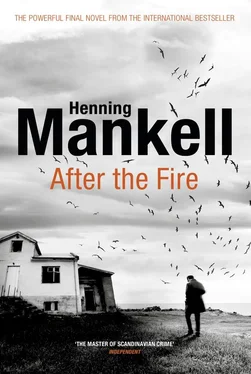‘I’ve been to the embassy; they’re hoping to be able to help me tomorrow.’
The connection was broken; perhaps Lisa had ended the call. I tried her number but couldn’t get through. However, she was coming to Paris, and she knew which hotel I was staying in. That must mean she wanted to see me. Everything was changing. I got dressed and went down to reception. Monsieur Pierre was back, looking less than clean-shaven.
I asked whether a Madame Modin from Sweden had booked a room for the following day. He studied his computer screen, then shook his head.
‘No Madame from Sweden, I’m afraid. Just a Canadian lady, Madame Andrews, who comes to stay with us once a year, in the autumn.’
I went out into the mild November evening. I ambled down to Gare Montparnasse, bought a Swedish newspaper, then went into a little restaurant that seemed to serve only French customers. I couldn’t see any tourists. I ordered sweetbreads; they weren’t very nice, but I was hungry. I drank wine and thought about my daughter, Lisa Modin and bloody Jansson — I would never be able to work him out.
When I had finished eating I drank a cup of coffee while I flicked through the newspaper. I realised I had already read it while I was waiting at the airport.
I left the restaurant feeling unexpectedly cheerful. I set off towards the Latin Quarter, even though my legs were aching from all the walking I had done during the day.
On the way I was once again overwhelmed by the feeling that I was older than everyone else.
I thought about Louise. Had someone at the embassy managed to track her down in the labyrinth of Paris police stations?
It occurred to me with something that might have been sorrow that I had never allowed myself to be Louise’s father. When she suddenly came into my life, I regarded her as more of a nuisance than a joy for a long time. Needless to say I had never admitted this to her. Nor had I confronted Harriet with my feelings, although I did blame her. She had robbed me of my daughter. Even though Louise was now part of my world, I would always be incapable of loving her the way I imagined one would love a child.
But perhaps that love would blossom when I met the child she was carrying? Or was that already a lost cause?
I wandered the streets, unable to reach any kind of clarity. Eventually I decided that the birth of a child meant the beginning of a new story in the great chronicle of mankind.
I had reached the lower part of the Jardin du Luxembourg when I remembered a jazz club I used to frequent whenever I came to Paris: Caveau de la Huchette. I knew exactly where it was. Perhaps it was still a jazz club? I needed a goal for my evening stroll.
I went into a bistro for a coffee. I noticed that a black woman who was sitting at a table with a man of about the same age kept glancing over at me. I looked around to see if she might be trying to attract the attention of someone else, but there was no one there — just the window panes glimmering in the light of the street lamps. She was perhaps ten years younger than me. I didn’t recognise her. I concentrated on my coffee, but every time I raised my eyes she was staring at me.
She must recognise me. Or possibly she thought she knew who I was, which seemed more likely.
She stood up abruptly and came towards me, pushing her way between the tables. Her husband, or whoever her companion was, seemed totally uninterested.
She spoke to me in English; I naturally assumed she had mistaken me for someone else.
‘I’m sure I recognise you,’ she said. I gestured to the chair opposite, and she sat down. ‘I remember your face,’ she went on. ‘From a long time ago. My mother was the same; she could recognise a person she had met only once, thirty or forty years earlier.’
‘And you can do that?’
‘Yes.’
‘But I have no idea who you are. Your face doesn’t ring any bells, your voice hasn’t triggered anything in my memory.’
She looked at me searchingly.
‘Now I’m certain,’ she said. ‘When we were both young you came to the customs office here in Paris to pick up a typewriter someone had sent you — I don’t remember which country it was from. You had to pay import duty because it was new, but you didn’t have any money. In the end I let you take it without paying anything. You were almost in tears.’
Now I remembered not just her but the whole situation. I had gone to Paris with a burning ambition to become a writer. I had sent a letter to my father, asking him to buy a typewriter and send it to me. I promised I would earn enough money through my writing to be able to pay him back. I didn’t think for a moment that he would actually do it, but one day I was summoned to the French customs office. And it was indeed the woman sitting opposite me who had allowed me to take away the pale blue typewriter in its black case without paying the import duty.
‘How can you possibly remember that?’ I asked her.
‘I don’t know. I just saw you and I knew exactly who you were. You pleaded with me; you were young and poor. Was it Ireland you came from?’
‘Sweden.’
‘How did things turn out for you? Did you become a writer?’
‘I became a doctor.’
‘And what happened to the typewriter?’
‘I sold it a few years later when I ran out of money.’
She nodded and got to her feet.
‘Sometimes people do meet again,’ she said. ‘I’m glad I inherited my mother’s ability to recognise faces.’
She smiled and went back to her table. I was astounded. She didn’t seem to be telling her husband what had transpired.
I left the bistro; my legs were no longer aching, my footsteps felt light. For a while I was an old man allowing myself to forget about my burned-out house.
The club was exactly where I thought it was. I paid and went in. It was still early. My memories from all those years ago involved going down the stairs to a cellar bar late at night; now it was only eleven o’clock. The staircase and the cellar bar were the same, but when I reached the bottom step I realised I should have taken a closer look at the poster outside to see what kind of music was on tonight. The instruments and amplifiers arranged on the stage in the far corner told me it wasn’t going to be either modern or trad jazz. When I glanced around in the semi-darkness I could see that a reggae band was taking a break; there were dreadlocks and brightly coloured Rasta hats everywhere. However, there were plenty of older men and women with greying dreads sitting at the tables; I wasn’t the only person of my age.
I went to the bar and ordered a glass of Calvados. When the music burst into life behind me, I felt a wave of warmth flood my body.
I stayed by the bar and carried on drinking. The compact dance floor was soon packed; everyone seemed to be dancing with everyone else. Small, almost imperceptible movements of the legs and hips. The gentle sway made me think of the smooth swell of the sea.
A woman wearing a colourful turban was standing next to me at the bar. I asked if she would like to dance; I was astonished at my own courage. She said yes. We shuffled onto the floor. I learned the basics of dancing when I was at school, but on the few occasions when I danced with Harriet I was embarrassed by my ineptitude. Now, even though the floor was so crowded, I felt at more of a loss than ever. My partner noticed at once; I was moving as if I had hooves. Her disappointment was obvious; she looked at me as if I had deceived her, then walked away and left me there. Total humiliation.
I went up the stairs, followed by the sound of reggae music, and out onto the street.
I had almost reached my hotel when I took out my phone for some reason. It hadn’t rung, but I discovered that there was a text message from Louise: Where are you?
Читать дальше












